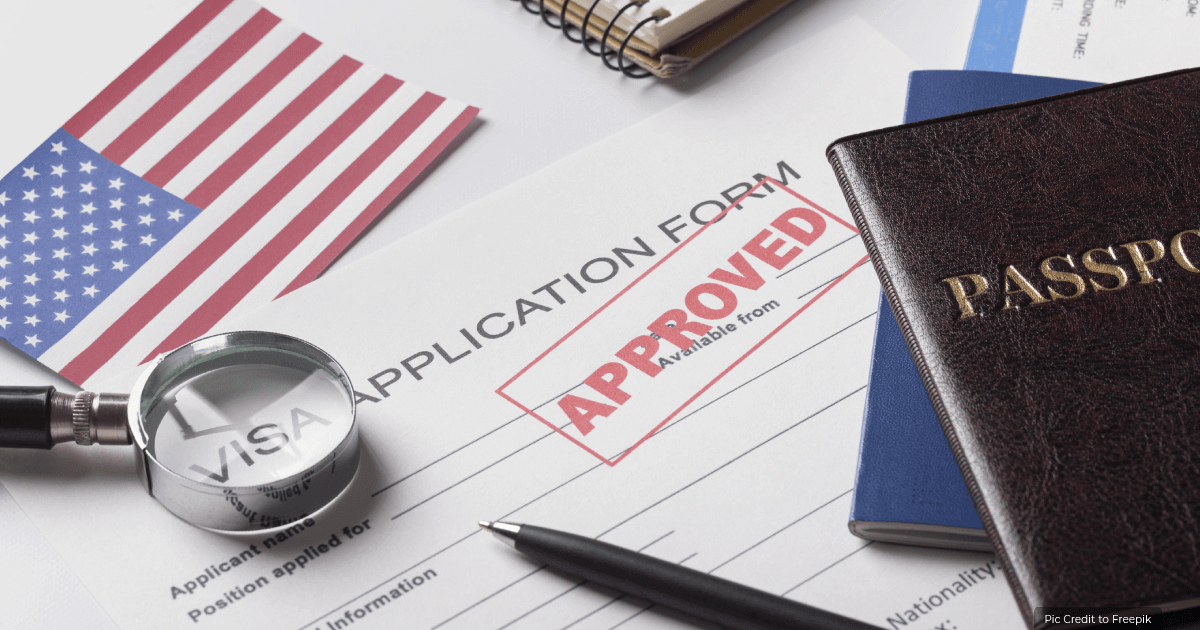Types of Student Visa in USA 2026 – There are many different types of Student Visa in USA, each with their own requirements and restrictions. Studying in the United States requires international students to understand the differences between these visas. Let’s explore the different types of student visa in USA and what they allow (or don’t allow) students to do while in the country. By the end of this post, you should have a better understanding of which visa is right for you and your academic goals. Read on to learn more about US student visas.

Types of Student Visa in USA 2026
US F Visa as Types of Student Visa in USA
For Academic Students Enrolled in a Full-time Program at an Accredited US Institution
The F visa has three types of visas, namely –
- F1- This is for the full-time students who stay and study in the US
- F2- This is for the dependents of F-1 visa holders who can be spouse and unmarried children under the age of 21)
- F3- This is for border commuters – Mexican and Canadian students who stay in their country of origin and commute regularly to attend part- or full-time school in the US.
Though there 3 types of F Visa designed to accommodate international students who are looking to pursue a full-time academic program at an accredited US institution, The F1 visa is known widely and we shall discuss about the same in detail here. The obligations of the visa include attending classes, finishing coursework on time, and properly maintaining student status in the United States. Moreover, it provides the main legal right to stay in the US throughout the duration of the academic program.
The US F1 visa is also necessary for part-time internships or practical training programs that are related to an individual’s major field of study. It offers eligible foreign students with numerous benefits and can also be a first step to permanent residence in the country with qualifications such as an employer sponsorship or entrepreneurial activities. Therefore, it is imperative for any international student wants to explore studying abroad in the United States to understand their eligibility and obtain a US F1 Visa so they can experience the nuances of American education firsthand.
US J Exchange Visitor Visa as Types of Student Visa in USA
For Participants in Approved Exchange Programs, Such as AU Pairs or Summer Work/travel Programs
There are 2 types of J visa in the US
- J-1 visas for exchange students on a relevant exchange program.
- J-2 visas for dependents of J-1 visa holders (as for F-2 visas)
Applying for a US J1 exchange visitor visa presents a great opportunity for individuals to participate in select approved exchange programs across the US. These programs include Au Pair, Summer Work Travel Programs and more, offering exciting cultural and educational experience to participants.
Exchange visitors accepted into these programs must comply with the terms of the program and are required to depart the U.S. upon completion of the program within their designated duration of stay. The US Department of State has laid out several stipulations for eligibility for such participant visas, so it is integral that exchange visitor applicants are familiar with all criteria before applying for their desired program.
US M Student Visa as Types of Student Visa in USA
For Vocational or Other Nonacademic Students Enrolled in a Full-time Program at an Accredited US Institution
Similar to that is F Visa, there are three categories in M Visa too –
- M-1 visas for students engaging in vocational or non-academic studies.
- M-2 visas for dependents of M-1 visa holders (similar to F-2 visas).
- M-3 visas are for ‘border commuters’ similar to F3 visa, but this is only for vocational or non-academic studies.
US M1 Student Visa is the perfect choice for anyone looking to enrol in a nonacademic program at an accredited US institution. This type of visa allows students to focus on vocational or other full-time educational training programs whilst studying an approved curriculum for up to one year. It also provides the necessary flexibility that some students need. Unlike J-1 visas, there’s no requirement to return to their home country for two years upon completing their visa requirements.
Beyond these study requirements, holders of this student visa are allowed to work off-campus at their place of employment while they attend school. With all these aspects considered, a US M1 student visa is certainly worth considering if you’re looking for an opportunity to learn and expand your career prospects within the United States. People with F-2, M-2, and J-2 visas can also study in the US as long as they fulfil the requirements of the university of their choice. They can, if qualified, apply for an F-1, M-1, or J-1 visa, but they are not mandated to apply.
Holders of J-2 visas are permitted to enrol as part-time or full-time, recreational or degree-seeking students and also choose to leave their program whenever they choose. By the time the principal J-1’s status expires, if they haven’t finished their academic program, they can also seek to be converted to F-1 students. This is only applicable if the J-1 visa holder is exempt from the two-year home residency requirement. Holders of F-2 and M-visas are not permitted to work; if you want to work, you must obtain the proper work visa. Holders of J-2 visas can apply for work permission from USCIS by submitting an I-765 form.
US H1B Temporary Worker Visa as Types of Student Visa in USA
For Highly Skilled Workers With a Job Offer From a US Employer
The US was built by immigrants and continues to benefit from the diversity that immigration has brought. The introduction of the US H1B Temporary Worker Visa in 1990 further enabled this way of life for highly skilled workers looking to come to the United States. This visa program is specifically designed for individuals who offer expertise in their field, providing a job offer from a qualified US employer as proof. It’s one of the most popular visas available and requires harsh requirements to obtain it – but with the right information and continued effort, anyone looking to work in the United States should be encouraged they can reach their career goals here.
US O1 Extraordinary Ability Worker Visa as Types of Student Visa in USA
For Individuals With Extraordinary Ability in Their Field, Such as Artists or Athletes
Being an extraordinary artist or athlete requires a global recognition of your abilities that often calls for touring, performing and entertaining internationally. The O-1 Extraordinary Ability Worker Visa can help make that possible by allowing those with exceptional talent in the arts, business, education, sciences and athletics to work on a temporary basis in the United States.
It helps acknowledge their incredible achievements and bring their excellence to American audiences. An attorney specializing in immigration laws can help get through the necessary steps of applying for such visas and make sure you have the best chance of obtaining necessary permission to pursue your art or sport professionally abroad.
Green Card (Permanent Resident)
For Those Who Wish to Live and Work Permanently in the United States
The dream of living and working permanently in the United States is shared by many people. A Green Card – also known as a Permanent Resident Card – allows a person to stay in the United States legally and permanently. Although it does not guarantee citizenships, it grants many of the rights and privileges of citizenship, such as working in any job field, purchasing property, attending public schools, and having access to numerous opportunities for professional success.
Having a Green Card also allows individuals to travel freely outside of the U.S., with some restrictions depending on how long they have had their Green Card before travelling. Furthermore, with a Green Card, family members can also be sponsored by the holder. If you are looking for an easier way to stay in the U.S., getting your Green Card will provide you with all you need to begin your new life!
Types of Student Visa in USA 2026 – Differences Between F-1, M-1, and J-1 Visas
| Visa Type | Focus | Key Benefits | Limitations |
|---|---|---|---|
| F-1 Visa | Academic programs (e.g., universities, high schools, language schools) | Offers flexibility with work (CPT, OPT), allows extension via STEM OPT | Strict limits on off-campus work |
| M-1 Visa | Vocational/technical training (e.g., culinary schools, mechanical training) | Offers practical training after course completion | No extension beyond one year; limited employment opportunities |
| J-1 Visa | Cultural exchange programs (e.g., research, internships) | Allows work within exchange scope, dependents may apply for work | Subject to home-country residency requirement in many cases |
Common Challenges Faced by Students
-
Proving Financial Ability
- Students must show adequate funding for tuition, living expenses, and unforeseen costs.
- Solutions include scholarships, sponsorships, and education loans.
-
Visa Denial Risks
- Common Reasons: Inadequate documentation, inability to prove ties to the home country, or weak financial evidence.
- Preparation Tips:
- Demonstrate clear academic and career goals.
- Highlight ties to your home country (family, property, or job offers post-graduation).
-
Post-Graduation Plans
- Many students struggle with transitioning from student to work visas (e.g., H-1B). Explore optional programs such as STEM OPT or cap-exempt H-1B opportunities.
Step-by-Step Guidance for Visa Interviews
-
Preparation
- Review your Form I-20 or DS-2019 to understand your program details and start date.
- Gather financial documents (e.g., bank statements, loan approval letters).
- Be ready to explain why you chose a specific university/program and how it aligns with your career goals.
-
During the Interview
- Maintain a confident, polite demeanor.
- Answer questions clearly and truthfully. Common questions include:
- “Why did you choose this school/program?”
- “How will you fund your education?”
- “What are your plans after graduation?”
Conclusion
We believe that after reading this article you must have got to know the Types of Student Visa in USA and what are the specification of all of them. However, if you need any professional assistance regarding study abroad journey, then academic counselors at SecureMyScholarship can help you. We assure to provide career counselling, application form submission and Visa assistance. Yes, you are at right place, fill the form and reach out to us today.
FAQ’s About Types of Student Visa in USA 2026
What is F-1 and J-1 visa?
The F-1 and J-1 visas are both nonimmigrant student visas. The F-1 visa is for full-time students at an accredited college, university, or other academic institution in the United States that have been accepted through a Student and Exchange Visitor Program (SEVP) certified school. With an F-1 visa, students can stay in the United States for up to 12 months following graduation and can work on-campus with certain restrictions. The J-1 visa is for exchange students coming to the United States for a specific educational program or job training.
This visa requires that the student participate in a program operated by an organization designated by the Department of State, such as the United States Information Agency or a college-affiliated exchange program. With an J-1 visa, students can stay in the United States for up to 18 months and may be eligible to work off campus with prior authorization. The key difference between F-1 and J-1 visas is that the J-1 visa requires participation in a designated program, while F-1 visa holders can pursue an education without such a requirement.
Is F-1 or J-1 Visa Better?
It depends on the individual. If you are looking to pursue an academic degree, then the F-1 visa is likely a better fit as it offers more flexibility and allows for more job opportunities following graduation. On the other hand, if you are looking to gain work experience in the United States, then a J-1 visa is probably a better option as it provides more opportunities to work off-campus. Ultimately, it is important to consider all the factors that go into deciding which visa is right for you and discuss them with a qualified immigration attorney.
What is the Difference Between F-1 and M-1 Visa?
The F-1 visa is for full-time students at an accredited college, university, or other academic institution in the United States that have been accepted through a Student and Exchange Visitor Program (SEVP) certified school. With an F-1 visa, students can stay in the United States for up to 12 months following graduation and can work on-campus with certain restrictions.
The M-1 visa is for students at vocational or nonacademic schools in the United States that have been accepted through an SEVP certified school. With an M-1 visa, students can stay in the United States up to one year following graduation and can work off-campus with prior authorization.
What is the Difference Between F-1 and i20 Visa?
The F-1 visa is for full-time students at an accredited college, university, or other academic institution in the United States that have been accepted through a Student and Exchange Visitor Program (SEVP) certified school. With an F-1 visa, students can stay in the United States for up to 12 months following graduation and can work on-campus with certain restrictions. The I-20 is a document that all foreign students accepted to a school in the United States must obtain.
The I-20 is used to apply for the F-1 visa, and it serves as proof of acceptance into the school and confirmation of sufficient financial resources to cover tuition and living expenses while studying in the United States. Without an I-20, students cannot apply for an F-1 visa and will not be able to study in the United States. The key difference between F-1 and I-20 visas is that while both are required to study in the US, the F-1 visa allows you to stay and work.
Who is eligible for J-1?
The J-1 visa is for exchange students coming to the United States for a specific educational program or job training. To be eligible, you must meet all of the following requirements:
- Be accepted into an Exchange Visitor Program as designated by the U.S. Department of State, such as the United States Information Agency or a college-affiliated exchange program
- Have a passport that is valid for the duration of your stay in the United States
- Show sufficient financial resources to cover your expenses while in the United States
- Provide evidence of adequate health insurance coverage
- Demonstrate an ability and intent to return to your home country upon completion of the program.
How long is F1 Visa Valid?
An F-1 visa is typically valid for the duration of a student’s academic program, plus an additional 60 days. This means that if you are enrolled in a four-year degree program, your F-1 visa will be valid for up to five years. During that period, your visa can also be extended or renewed if necessary.
Why Do F-1 Visas Get Rejected?
F-1 visas can be rejected for a variety of reasons, including but not limited to: insufficient financial resources, academic misconduct, falsified documents, failure to meet the requirements of an exchange visitor program, criminal history, and/or suspicion that the applicant intends to stay in the United States permanently. It is important to review all eligibility criteria before applying for a visa, and to consult with a qualified immigration attorney if you have any questions or concerns about the application process.
What is F-1 vs F-2 Student Visa?
The F-1 visa is granted to students who are enrolled in full-time academic programs at U.S. institutions. The F-2 visa, in contrast, is issued to the dependents of F-1 visa holders, such as their spouse or children under 21 years old. While F-2 visa holders are allowed to reside in the U.S. with the primary F-1 visa holder, they cannot work or pursue full-time academic studies. However, children on an F-2 visa can attend elementary or secondary schools.
What is F-1 and B1/B2 Visa?
The F-1 visa allows international students to live and study in the U.S. for the duration of their academic program at SEVP-certified schools. In contrast, the B1/B2 visa is a temporary visa for short-term visits, with B1 intended for business purposes and B2 for tourism or medical treatment. Unlike the F-1 visa, the B1/B2 visa does not permit long-term stays or enrollment in academic programs.
How Long Can I Stay in the USA with an M-1 Visa?
M-1 visa holders are allowed to stay in the U.S. for the duration of their vocational program, plus an additional 30 days to prepare for departure. However, the total stay cannot exceed one year unless an extension is approved. Unlike F-1 visas, M-1 visa holders have limited options for extending their stay or transitioning to other visas.





